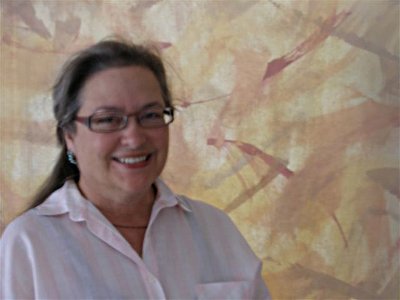Arts & Life

MIDDLETOWN – The work of fabric artist Shirley Dodge is on display in the sanctuary at Middletown Community United Methodist Church through Nov. 24.
Featured are Dodge's painted cotton wall hangings.
The display is open to the public on Sundays from 9 a.m. to 3 p.m., on from 9 a.m. to noon on Wednesdays and Fridays.
“We are excited to have these original abstract works displayed in the sanctuary,” said Pastor Voris Brumfield. “It is our desire to regularly solicit artworks for display after Jan. 1, 2010, for monthly exhibits.”
Shirley Dodge has painted and printed fine fabrics and art pieces for interior design for many years and has exhibited her paintings and drawings in Northern California.
Dodge is known primarily for her fabric design in the interior design centers in San Francisco and Los Angeles.
Previous to the fabric design work, her paintings have been exhibited in one person and group shows throughout California, receiving various awards.
She received her bachelor of arts degree in art and a teaching credential from Sonoma State University. Dodge received the Evans Memorial Award in the Mill Valley Fall Arts Festival, and her fabric installation was chosen for exhibition in the Dyer’s Art Exhibit, a major exhibit of more than 30 textile artists working within the Pacific Basin, sponsored by the Pacific Design Center in Los Angeles, curated by Jack Lenor Larsen.
During this time, Dodge developed her custom hand-painted fabric yardage, for interior design nationally. She was honored by invitation to a textile exhibition at the Cooper Hewitt Design Museum, at the Smithsonian Institute in New York in 1984.
Her line of custom painted fabrics, “Von Stith Prints,” was featured in designer showrooms nationally and developed in her studio in Sebastopol.
She and her husband Wayne Stith moved to Hidden Valley Lake in 1989, where she has continued her design work, has been teaching art to young children, and designing and sewing clothing and hand bags.
For more information contact
- Details
- Written by: Editor
The show will take place from 7 p.m. to 10:30 p.m.
Celebrating their 13th year together, Four Shillings Short perform on a fantastic array of instruments from around the world – including the North Indian sitar, hammered dulcimer, mandolins, banjo, whistles, recorders, medieval and renaissance woodwinds, charango, bowed psaltery, guitar, and even a krumhorn.
The husband/wife duo of Aodh Og O’Tuama from Cork, Ireland and Christy Martin from California, tour in the US and Ireland, live as full-time minstrels and have been bringing their one-of-a-kind eclectic blend of music around the country since they first met and fell in love in 1995.
The Corkman's Clipper Irish Pub is located at 14677 Lakeshore Drive in Clearlake, telephone 707-994-9933. Visit the pub's Web site at www.corkmansclipper.com .
- Details
- Written by: Editor

 How to resolve AdBlock issue?
How to resolve AdBlock issue? 



